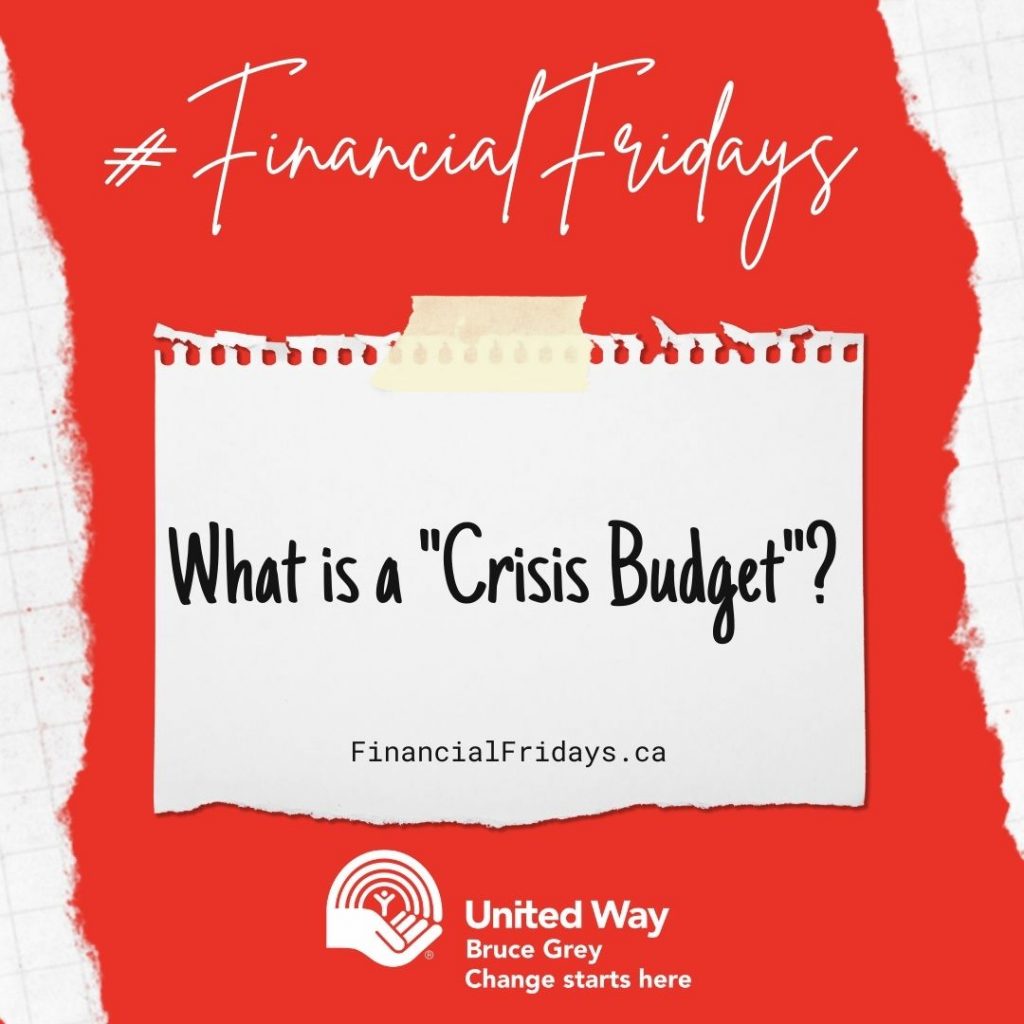#FinancialFridays: What is a “Crisis Budget”?
Whether we have one or not, we know that a budget is a good tool for maintaining control over our money. We can do an amazing job in creating a plan and following that plan. But we should also have a plan for when life throws us a curve ball.
We never know when life is going to go sideways, a job loss, temporary layoff, massive car repair bill, a disaster, or the loss of a family member. Having what we’re calling a “crisis budget” can help you navigate a difficult time.

What is a Crisis Budget?
A crisis budget is different from a typical household budget because it helps you identify the items on your budget that are nice to haves from the need to have. When a crisis hits, you may need to make changes to your spending to avoid going into debt.
Housing is always the top priority.
Look at what you need to do and pay for, rather than the nice to-haves. We know having wants met is part of living a good life, but pausing them, while you navigate a difficult turn can help you get past the challenging times slightly faster.
The basic idea behind a crisis budget is identifying those budget items that you need and those that you want, and focusing only on the necessities. After all, what good is cable if you don’t have a home to watch it in?
It’s important to understand that these changes that need to be made are probably not permanent. Understanding this will make it easier to cut expenses out of your life if you know that you will be able to bring them back into your lifestyle once your finances are in a better condition.
We’re all living in challenging times already, and needing to cut more feels impossible.
For some, creating and committing to a budget at all is a difficult enough task to accomplish, so it’s understandable that the thought of an even stricter “crisis” budget might seem impossible. Remember that these extra budget cuts are temporary.
Think about the things you spend money on right now that you can live without for a few weeks or months, and cut them out of your budget. Going without satellite or cable TV might seem horrifying, but there are a lot of free things to stream on the internet. You may find you don’t even add it back in when life returns to normal.
If you’re not sure if it’s a need or a want, cut it, and see how it goes. We can all be focused on a goal for short periods of time.
Needs
- Rent/Mortgage
- Utility Bills
- Groceries
- Gas for a car for work
- Insurances
- Medication and medical services
- Basic cell phone package
- Basic internet service
Wants
- Cable TV
- Dinners out
- Recreation costs
- Movie tickets
- Hair/Cosmetic
- Expensive cell phone data plan
So, How Do I Create a Crisis Budget?
It’s best to create a crisis budget BEFORE a crisis. So work on your budget and arrange the items into Needs and Wants. That way you already know what you could cut.
If you’re projecting for a job loss, will you get a severance? Pre-paying utility bills with a severance is a great way to boost your budget over a period of months, so that once that credit is eaten up, you may have found new work.
Connecting with programs such as the Good Food Box can reduce your grocery budget, and is something you can use regardless of crisis or not to reduce your food costs. If children have birthdays during this crisis, this can feel challenging and hard as a parent. But children love experiences, so outings to free parks, and time spent doing things they like to do that are free can be part of the game for kids. The key will be to not ‘overdo it’ when the crisis ends.
Once you determine what your needs are, you’ll now have to try to determine what your income will be, if this crisis budget is for a scenario for a loss of income. If you’re laid off, will you get a severance package, and for how long? Will you be eligible for unemployment? If so, how much will these benefits pay you? A good place to start with regard to income is to re-do your budget as if you had half of your income available. Imagine your spouse lost their job, or you have an enormous hospital bill
How Do You Prepare Your Kids for a Financial Crisis?
Explain to your kids, in terms they can understand, what the problem is and how you plan to fix it. They will pick up on your tension, and if you hide the issue, they will know something is wrong, and think the worst. Engaging them in the game of “money saved” can also teach them good money management. By explaining it to them, even in the simplest of terms, you can put their young minds at ease and prevent them from worrying needlessly.
Being prepared is 80% of the challenge going into a difficult time. Reaching out and utilizing community support is not admitting defeat, it’s simply using resources put in place for this exact purpose. The number of times someone has said to me “I’m not your usual client” when the reality is, they ARE my usual client: someone who has had the rug pulled out from under them.

